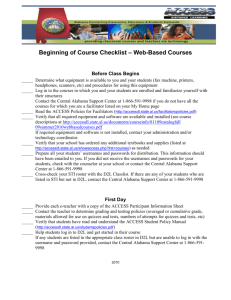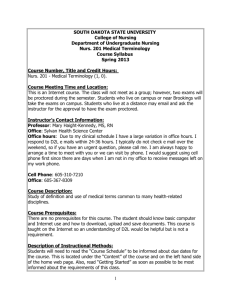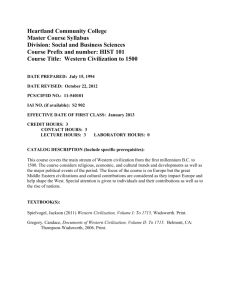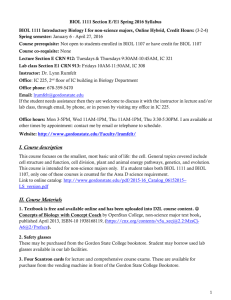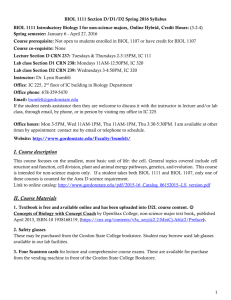BIOL 1111-A syllabus - Gordon State College
advertisement
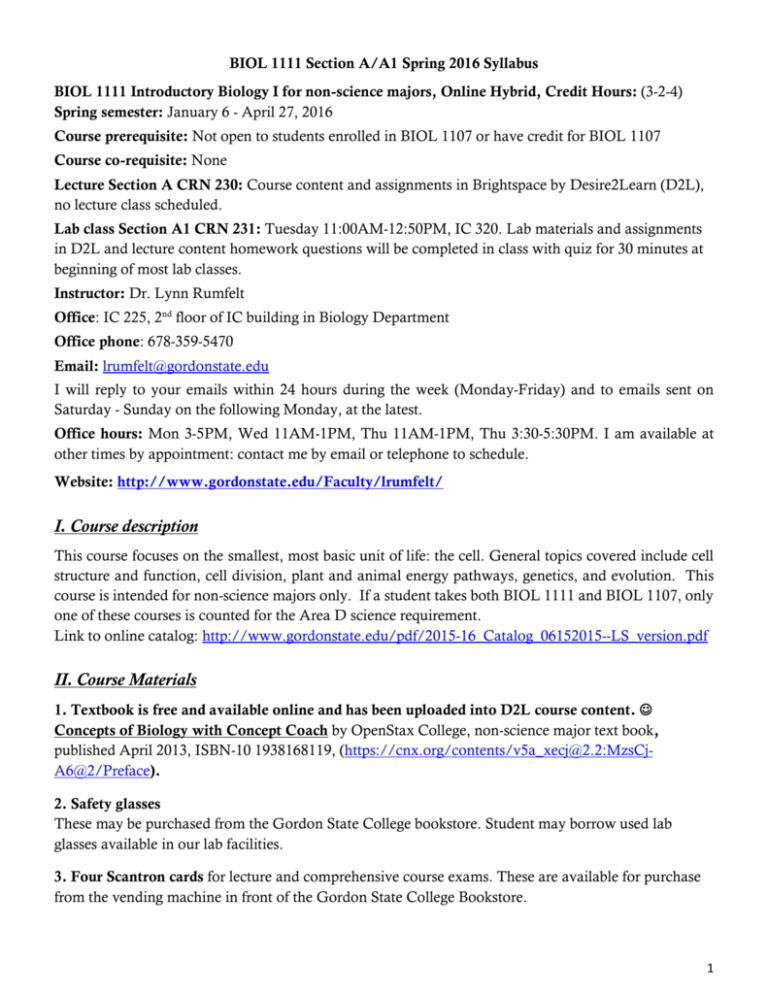
BIOL 1111 Section A/A1 Spring 2016 Syllabus BIOL 1111 Introductory Biology I for non-science majors, Online Hybrid, Credit Hours: (3-2-4) Spring semester: January 6 - April 27, 2016 Course prerequisite: Not open to students enrolled in BIOL 1107 or have credit for BIOL 1107 Course co-requisite: None Lecture Section A CRN 230: Course content and assignments in Brightspace by Desire2Learn (D2L), no lecture class scheduled. Lab class Section A1 CRN 231: Tuesday 11:00AM-12:50PM, IC 320. Lab materials and assignments in D2L and lecture content homework questions will be completed in class with quiz for 30 minutes at beginning of most lab classes. Instructor: Dr. Lynn Rumfelt Office: IC 225, 2nd floor of IC building in Biology Department Office phone: 678-359-5470 Email: lrumfelt@gordonstate.edu I will reply to your emails within 24 hours during the week (Monday-Friday) and to emails sent on Saturday - Sunday on the following Monday, at the latest. Office hours: Mon 3-5PM, Wed 11AM-1PM, Thu 11AM-1PM, Thu 3:30-5:30PM. I am available at other times by appointment: contact me by email or telephone to schedule. Website: http://www.gordonstate.edu/Faculty/lrumfelt/ I. Course description This course focuses on the smallest, most basic unit of life: the cell. General topics covered include cell structure and function, cell division, plant and animal energy pathways, genetics, and evolution. This course is intended for non-science majors only. If a student takes both BIOL 1111 and BIOL 1107, only one of these courses is counted for the Area D science requirement. Link to online catalog: http://www.gordonstate.edu/pdf/2015-16_Catalog_06152015--LS_version.pdf II. Course Materials 1. Textbook is free and available online and has been uploaded into D2L course content. Concepts of Biology with Concept Coach by OpenStax College, non-science major text book, published April 2013, ISBN-10 1938168119, (https://cnx.org/contents/v5a_xecj@2.2:MzsCjA6@2/Preface). 2. Safety glasses These may be purchased from the Gordon State College bookstore. Student may borrow used lab glasses available in our lab facilities. 3. Four Scantron cards for lecture and comprehensive course exams. These are available for purchase from the vending machine in front of the Gordon State College Bookstore. 1 III. Success in the course This course is an online hybrid course with the lecture content and lecture assessment presented online in the Desire2Learn (D2L) learning management system available at the Gordon State College website (https://gordonstate.view.usg.edu/). The enrolled student studies this online material and completes assignments in an independent manner. If the student needs assistance or clarification of lecture content then they are welcome to discuss it with the instructor in lab class, or by email and telephone, or visit me in my office IC 225. The hybrid portion of the course is the laboratory class, which meets once per week in IC 320 on the main college campus. Attendance of laboratory classes in person is required as well as completion of labassociated work, in order to pass this course. Success in this course with a passing grade requires the following from enrolled students: i. Dedicated study time and location to review course content, complete course assessments online, and prepare any questions for the instructor so the student may understand the material better. In general, students should study 2 to 3 hours per week for each unit of credit in a typical 16 week class (resource: SmarterMeasure), which for this course is 8-12 hours per week. ii. Regular and reliable access to computer with an Internet connection. iii. Student use Brightspace by Desire2Learn (D2L) to access the course textbook, course content, assignments, and assessments. If unfamiliar with D2L system, then watch the Brightspace/Desire2Learn instructional video by our Instructional Technologist, Ms. Schaffer in the link below: http://faculty.gordonstate.edu/autumns/videos/desire2learnorientationforstudents/desire2lear norientationforstudents.html iv. Completion of assignments and assessments on time. Late work is not accepted. v. Student attend laboratory classes once per week on Tuesdays 11:00AM-12:50PM in IC 320 on the Gordon State College main campus on these dates: Tuesday Jan 12, 2016 Tuesday Jan 19, 2016 Tuesday Jan 26, 2016 Tuesday Feb 2, 2016 Tuesday Feb 9, 2016 Tuesday Feb 16, 2016 Tuesday Feb 23, 2016 Tuesday Mar 1, 2016 Tuesday Mar 15, 2016 Tuesday Mar 22, 2016 Tuesday Mar 29, 2016 Tuesday Apr 5, 2016 Tuesday Apr 12, 2016 Tuesday Apr 19, 2016 Tuesday Apr 26, 2016 Note: See attendance and tardiness policies for lab class Part VII. Student Rights and responsibilities, section 4. vi. Check D2L course homepage and D2L email regularly each week for important information from the instructor. vii. Get help from your instructor as soon as is needed by visiting during office hours or visiting by appointment outside of office hours, and/or visiting peer tutors in the Gordon State College Student Success Center (SSC). SSC website: http://www.gordonstate.edu/successcenter/home. 2 IV. Specific student learning outcomes The student will read the course text book and complete assignments and assessments pertaining to the general student learning outcomes for this introductory biology course: 1. Understand the general process of “Science” o Collection, analysis, and interpretation of qualitative and quantitative data o The Scientific Method 2. Identify the chemicals of life and how they interact o Atoms, Bonds/ Molecules, Water, pH o Biological Molecules, structure and formation, 3. Know the structure and functions of cellular organelles. o Cell structures and function o Cell membrane structure and function, transport, diffusion/osmosis 4. Understand the integration of molecules and cells in the production of energy necessary for life o Energy flow in cells, exergonic and endergonic reactions, catalysts/enzymes, inhibition o Photosynthesis, important structures, light and Calvin reactions o Glycolysis and cellular respiration, structures and reactions, fermentation 5. Understand the principles of heredity o Cellular reproduction, cell cycles, gene/chromosome/DNA, mitosis, meiosis, o Inheritance, Gregor Mendel, Punnett squares, genotypes, phenotypes o DNA structure function, James Watson and Francis Crick, DNA replication, o Gene expression and regulation, transcription, translation, mutations 6. Understand evolutionary concepts including history and mechanisms o Principles of evolution, history of evolution, Charles Darwin and Wallace, mechanisms of evolution: natural selection, mutation, genetic drift, and gene flow; evidence of evolution: fossil record, anatomy and embryology, molecular biology, and biogeography V. D2L access to course materials, assessments, and grades Student have access to the textbook, course materials, assignments, assessments, and grades through the web-based learning management system, Brightspace by Desire2Learn (D2L). Each student is given access to their grades in a private and secure manner. Directions to access course materials in D2L It is important to use the internet browser Mozilla Firefox for better functioning in D2L because Internet Explorer is not sufficiently reliable. You may check your web browser using the D2L System Checker: http://www.usg.edu/usgweb/d2lchecker/ to make sure your computer configuration is compatible with D2L. 1. Go to MY GORDON web page and open the link for “Brightspace/Desire2Learn” which opens up a new window. 2. Log in to D2L Enter your name and password using the same information as for email access. Note: Suggest students keep their D2L username and password in an accessible location for quick retrieval. The instructor does not have 3 access to a student’s password. If the password is forgotten, then click on the link “forgot password?” to receive new password through Gordon State College email (not D2L email system). 3. Access course materials Select the BIOL 1111 course under My Courses in the right hand column to gain access to the course content. The D2L content also contains the materials and instructions for the laboratory portion of this course. Note: No content is available in the BIOL 1111L lab course, so ignore this course in D2L. 4. Communication with Instructor Questions are welcomed during our lab classes or at any other time. In addition, if need to discuss any issues then please contact me through D2L email, office phone 678-359-5470, or Gordon State College email (lrumfelt@gordonstate.edu). VI. Exams Schedule and Statement of Alternative Testing Facility in Lieu of On-Campus Assessment If the student feels they cannot attend the required on-campus final exam, then they will need to contact the instructor of the course to make alternative arrangements at the beginning of the semester to set up alternative testing site for the final exam. If a testing facility is required for the student to be assessed offcampus, then it is the student’s responsibility to make and pay for the alternative arrangements with the Gordon State College testing center. The student will then contact the instructor, Dr. Rumfelt, who will determine if the off-campus arrangements are acceptable. Dr. Rumfelt will notify the student of the final decision about testing at the alternative site. Lecture exams 1-3, and Lab exams 1-2 are excluded from the alternative testing facility since they will be given in IC 320 per Table I. Table I. Exam Schedule Exam Topic Date/Time Room Materials to bring Lecture Exam 1 Chapters 1-3 2/2/16 11AM-12PM IC 320 Scantron, #2 pencil, cheat sheet Lab Exam 1 2/23/16 11AM-12:50PM IC 320 Calculator, pen/pencil, cheat sheet 3/1/16 11AM-12PM IC 320 Scantron, #2 pencil, cheat sheet Lecture Exam 3 Chapters 8-10 4/5/16 11AM-12PM IC 320 Scantron, #2 pencil, cheat sheet Lab Exam 2 Labs 7-11 IC 320 Calculator, pen/pencil, cheat sheet Final Exam Chapters 1-12 4/29/16 3:45PM-5:45PM IC 320 Scantron, #2 pencil, cheat sheet Labs 1-6 Lecture Exam 2 Chapters 4-7 4/19/16 11AM-12:50PM 4 VII. Student Rights and responsibilities Section 1. Availability of services by the Americans with Disabilities Act (ADA) Gordon State College is committed to making reasonable efforts to assist individuals with disabilities in their efforts to access a high quality post-secondary education. Gordon State College will provide reasonable accommodations for persons with documented qualifying disabilities in accordance with the policies of the University System of Georgia and Gordon State College. If you have a disability and feel you need accommodations in this course, you must present a current letter to me from Accessibility Services, indicating the existence of a disability and the approved accommodations. To register a disability contact Accessibility Services, Student Center, Room 212, 678-359-5585 under the direction of Mrs. Laura Bowen. Call for an appointment with Mrs. Bowen for documentation review and assessment for an accommodation. Upon approval, you will be given a letter stating the accommodations allowed, which your professor will sign and you return to Mrs. Bowen. Make sure to apply early in the semester for these accommodations since they begin upon date of approval from Student Counseling and Disability Services office and not beforehand. Section 2. Title IX of the Education Amendments of 1972, 20 U.S.C. §1681 et seq. Title IX is a comprehensive federal law that prohibits discrimination on the basis of sex in any federally funded education program or activity. The principal objective of Title IX is to avoid the use of federal money to support sex discrimination in education programs and to provide individual citizens effective protection against those practices. Gordon State College is committed to providing an environment free of all forms of discrimination and sexual harassment, including sexual assault, domestic violence, dating violence and stalking. If you (or someone you know) has experienced or experiences any of these incidents, know that you are not alone. All faculty members at Gordon State College are mandated reporters. Any student reporting any type of sexual harassment, sexual assault, dating violence, domestic violence or stalking must be made aware that any report made to a faculty member under the provisions of Title IX will be reported to the Title IX Coordinator or a Title IX Deputy Coordinator. If you wish to speak with someone confidentially, you must contact the Counseling and Accessibility Services office, Room 212, Student Life Center. The licensed counselors in the Counseling Office are able to provide confidential support. Gordon State College does not discriminate against any student on the basis of pregnancy, parenting or related conditions. Students seeking accommodations on the basis of pregnancy, parenting or related conditions should contact Counseling and Accessibility Services regarding the process of documenting pregnancy related issues and being approved for accommodations, including pregnancy-related absences as defined under Title IX. Section 3. Academic Dishonesty Policy – Plagiarism and Cheating Plagiarism is defined as “the act of using another person's words or ideas without giving credit to that person”, (reference: http://www.merriam-webster.com/dictionary/plagiarism). However, plagiarism may also be use of another’s words or ideas, even with citations, if the work has not been written in one’s own words that are significantly different from the original wording. 5 All course work, in general, is expected to be done by each student’s own efforts and not to be achieved by plagiarism. Examples of work expected to be completed by each individual student on their own, without plagiarizing, are quizzes, written exams, homework, and discussions. Lab reports are expected to be collaborative effort between the two students working together as a team but not achieved by plagiarizing the work of other lab teams. Plagiarism and cheating are serious academic offences. If the instructor determines the student’s work has been plagiarized then this may result in a 0% grade for the particular assignment for all parties involved. If continued incidences of plagiarism or cheating occur after the first incident then all students engaged in plagiarism/cheating may receive an additional 25% reduction of final grade for the course. If the plagiarism/cheating offense is deemed severe enough or the student continues this behavior after discussion of the issues with the instructor, then this may result in the student not passing the course and receiving an F grade. In addition, the plagiarism/cheating incident, as per college procedures, may be reported to the Department Head of Biology, Dean of the School of Arts and Sciences, Vice President of Student Affairs, and/or the Associate Vice President of Academic Affairs and/or the Provost/Vice President of Academic Affairs. In cases where further action is warranted, a recommendation to that effect will be made to the Vice President of Student Affairs, the Associate Vice President of Academic Affairs, and the Provost/Vice President of Academic Affairs. Per the student catalog students may be also required by the instructor to complete a documentation workshop given by the Student Success Center and show proof of this completion to the instructor in the same semester as enrolled in this course. Review the academic catalog concerning plagiarism and cheating in the student conduct code: Student Code of Conduct and Academic Dishonesty Policy in current catalog. The student code of conduct mandated by the college constitutes policies to guide and direct the student in their actions in campus life. If there are any questions concerning these policies then please discuss them with your instructor. More information on plagiarism: http://www.gordonstate.edu/pdf/2015-16_Catalog_06152015-LS_version.pdf. Section 4. Couse enrollment verification, course attendance policy, and class tardiness A. Course enrollment verification Review the course syllabus and complete the syllabus quiz on this material in D2L by Wednesday, January 13, 2016 10:00 PM. If the syllabus quiz is not completed in D2L by this time and date then the student will be reported to the Registrar as non-attending and will be dropped from the course roll, without exception. Our first lab class is January 12th. If the student does not attend the 1st lab then the student will be reported as non-attending to the Registrar and will be dropped from the course rolls, without exception. B. Course attendance policy Attendance in lab class is documented in the D2L attendance by the instructor and may be viewed at any time by students after January 6th. 6 Students absent for four labs, for any reason, receive a 25% grade reduction on both Lab Exams 1 and 2. Students absent for five labs, for any reason, receive an F letter grade and fail the course. Students do not need to show any proof of absence or lateness to the instructor. Absences for students, which have been pre-approved by Academic Affairs, are excused from this attendance policy. If the pre-approved excused absence conflicts with a scheduled exam then the student will receive a make-up exam, at a time and date determined by the instructor. Students with pre-approved absences may make up missed lab classes by completion of an alternative assignment, decided upon by the instructor. C. Class tardiness Students arriving late for class starting with Lab 2 on January 19th and thereafter, will be marked as absent and will not be allowed to complete the lab for that day nor be able to submit a lab report. If a student arrives late for any exam, they will always be admitted, however, the late student will not receive additional time to complete the exam. Section 5. Course etiquette Students will maintain a college-level etiquette, acceptance, and tolerance of other students and their thoughts/beliefs during communications in the course. The online classroom is the same as direct instruction classroom except that it is in a virtual environment. The online classroom is a community of students and an instructor and comes with the same expectations of behavior by the student towards their fellow classmates and the instructor as in the laboratory classroom. Discrimination, lack of respect, or other inappropriate behavior towards other students or the instructor will not be tolerated and may be grounds for withdrawal from the course. Please see Student Code of Conduct, in the current academic catalog. VIII. Grading The final course grade is based upon completion of the assigned work shown in Table II and is a weighted average that is cumulative. This means the final course grade achieved by each student is based on the student’s entire body of work over the four month long semester, and is not just based on the last exam of the semester. Students will be able to see their cumulative grade for each work submitted throughout the semester by viewing their grade in D2L. Work is graded using 0-100% scale shown in Table III or Pass/Fail (Pass = 100% and Fail =0%), depending on the particular assignment/assessment. Late work for any assignment or assessment receives 0% grade. 7 Table II. Course work Percentage of course grade Item Course work 1 60 6 Exams: 3 Lecture 2 Lab 1 Final Each exam = 10% total grade 2 10 Concept Coach 3 15 Quizzes – textbook chapters, before lab, & during lab 4 15 Lab work reports Total 100 Table III. Grade scale Letter grade Grading scale A 89.6 - 100 B 79.6 – 89.5 C 69.6 – 79.5 D 59.6 – 69.5 F Less than 59.6 Description of graded work 1. Exams 60% total grade Each exam is worth 10% of the total course grade. Each exam counts towards the final grade and no exams are dropped from the final grade calculation. All exams are given during lab class. Exams are graded usually within one week and returned to the student at the following lab class. Exam grades are posted in D2L gradebook. Exam questions are true/false, multiple-choice, and short answers based on student learning outcomes for text book chapters, chapter quizzes, Concept Coach questions, and class instruction. During the exam the following will occur: All personal belongings, electronic devices turned off will be stored at the white board area in the classroom and may be retrieved after the student completes their exam. Only materials needed for the exam will be available to the student. 8 Please note: if an electronic device is present on the student’s person while they are taking the exam, then the student receives a 0% grade for that exam, without exception. Students sit near someone other than their lab partner or friend. Students are expected to have prepared a cheat sheet for lecture exams, lab exams, and the final exam. Preparation of cheat sheet for each exam will be awarded one extra credit point per exam and will be turned in with each exam. i. Lecture exams 1-3 Lecture exams 1-3 will be given for the first hour of laboratory class in IC 320, 11AM-12PM on February 2nd, March 1st, and April 5th. Students bring their own Scantron cards and #2 pencils for these exams. Scantron cards may be purchased from the College bookstore. If a student forgets to bring a Scantron to an exam then they may leave to purchase one and return to take the exam during the exam time remaining. Note: exam time will not be extended. ii. Lab exams 1-2 Lab exams will be over lab material completed in lab classes. Lab exam I will cover content from Labs 1-6, February 23rd 11AM-12:50PM, IC 320 and Lab Exam II covers content from Labs 7-12, April 19th 11AM-12:50PM, IC 320. The exam questions are based on the student learning outcomes, lab materials given to the students, student’s lab reports, and pre-lab quizzes. The question format will be multiple choice, true/false, short answer, graphing and analysis. Lab exams are written exams that do not use Scantrons. Exams will be graded by the instructor and returned for review generally by the next lab class. iii. Final exam The final exam covers lecture material for the semester over textbook chapters 1-12. A review and question & answer period will be held on the April 26th lab class. The final exam format is similar to previous lecture exams 1-3. To prepare for the final, students should review questions on the lecture exams 1-3, lecture quizzes, and Concept Coach questions. The final exam is April 29th 3:45-5:45PM, in IC 320. Attendance in the final exam is required for completion of the course. If the student misses the final this will result in a course grade of WF. iv. Missed exam If any exam, except the final exam, is missed for any reason, then the student receives 0% grade. At the end of the semester, the instructor replaces the 0% exam grade with the final exam grade. Thus, the final exam would count as two exam grades instead of one. By its nature, the final exam is harder than the previous lecture exams since it covers material from chapters 1-12, miss an exam is not advised by your instructor. If any additional exams are missed, then the 0% grade for that specific exam is not replaced by the final exam nor may be made up. v. “Cheat sheet” and extra credit opportunity preparing for lecture, lab, and final exams “Cheat sheet”: Students are to bring to every exam, a sheet of notebook-sized paper, 8.5 x 11 inches, with their exam preparation notes written on one side only for use during the exam. Any information may be used on your cheat sheet. If both sides have writing then student must choose a side to be taped down and not accessible during the exam. An extra credit point will be applied the exam, where a cheat sheet was turned in with the completed exam. 9 2. Concept Coach Chapter assignments, 10% total grade To improve student learning outcomes a free tool, called Concept Coach, has been embedded in the web view of OpenStax’s Concepts of Biology textbook. As students read, they will be asked questions to reinforce their understanding of the content. Concept Coach automatically incorporates proven cognitive science principles — spaced practice, retrieval practice, and feedback — to increase students' long-term retention. Student answers to the Concept Cocah questions form the basis of this grade. Concept Coach questions must be completed by specific dates identified in the assignment schedule at end of syllabus. If Concept Coach Chapter work has not been completed by its deadline specified in the syllabus then 0% grade will be entered into the D2L grade book. Students must register for Concept Coach online by following these steps below: i. Paste this link in your web browser to visit your Concepts of Bio (non-majors) textbook: https://cnx.org/contents/v5a_xecj@2.2:3 ii. Click on section 1.1 in the book. Scroll to the bottom of the section and click on the Concept Coach button. iii. Click "Sign up" and follow the prompts to create your free account. iv. At the end of your account set-up, you will be prompted to enter your two-word enrollment code: able music v. Continue to your Concept Coach questions! 3. Chapter Quizzes, Before Lab Quizzes, and During Lab Quizzes 15% total grade Important technical note: It is required to only access quizzes using a hard wired computer or portable computer with a strong wireless connection. DO NOT USE MOBILE DEVICES for quizzes. The mobile devices may cause problems resulting in 0% grade for quizzes. Quizzes are available only at specific times and dates posted at end of syllabus schedule. When the deadline has been reached the quiz will close, and after this closing time/date then each student is given access to their answers both correct and incorrect. It is up to the student to identify correct answers by use of the text book. If help is needed then students should discuss their quiz answers with the instructor after a quiz has closed. Each quiz may be completed unlimited number of times (attempts). The quiz grade posted automatically in D2L grade book will be the highest score out of the all attempts achieved. If no quiz is completed by the student during the available period, then a 0% grade is assigned and may not made up. i. Chapter quizzes The purpose of the chapter quizzes is to help the student review the reading material and may be used as source of questions for exams. Textbook chapter quizzes are due according to the schedule at the end of the syllabus. A link is provided to each quiz for every chapter within its folder. 10 ii. Before Lab quizzes The purpose of the before lab quizzes is to help prepare for the lab by reading the lab materials ahead of lab class. Before lab quizzes are to be completed before the start of each lab class according to the schedule at the end of the syllabus. A link is provided to each quiz for every lab within its folder. iii. During lab quizzes Some class work and discussion based on the text book material may be given at the beginning of lab class and short quizzes will be given at the end of this instruction period. These quizzes will be graded by instructor and returned next lab class. Grade will be posted in D2L grade book. If absent for lab then this quiz may not be made up. Class work quiz questions will be posted for viewing in D2L chapter folder. 4. Lab reports, 15% total grade Biology lab class allows students to analyze, explore, and have fun. In general, students work with one lab partner of their choice and are free to change lab partners. Lab instructions are given to the students in the D2L lab folder, within the D2L lecture course and contain directions and questions to be completed during the lab. Completion of the lab and answers to questions in the instructions constitutes a “lab report”. Lab reports are graded according to a rubric below: BIOL 1111 Lab ______ report rubric Exceeds Standard Meets Standard Approaching Standard Below Standard 4 points 3 points 2 points 1 point Score All questions in lab report are answered. Most questions in lab report are answered. Several questions in lab report are left blank. More than half the questions in the lab report are left blank. Answers in lab report show comprehension of the question and are written with thoughtfulness. Answers in lab report mostly show understanding of the question and are mostly written with thoughtfulness. Answers in lab report show unclear understanding of the question in several answers and are not written with thoughtfulness. Answers in lab report show mostly misunderstanding of the question and are not well written. Answers are written using student’s own words. Answers are written using mostly student’s own words. Answers are written using some of the student’s own words. Answers are written using plagiarized work of another and are not written using the student’s own words. Answers are correct. Answers are mostly correct. Some answers are correct. Most answers are incorrect. Answers are neatly written and legible. Answers are mostly neatly written and legible. Answers are partially neatly written and partially legible. Answers are not neatly written and not legible. 11 Graphs are properly labeled and well-drawn. Graphs are mostly properly labeled and well-drawn. Graphs have missing labels and/or partially well-drawn. Graphs are not properly labeled and not welldrawn. Tables are filled out with appropriate data. Tables are mostly filled out with appropriate data. Tables are partially filled out with appropriate data. Tables are not filled out with appropriate data. Conclusions are well thought out and complete. Conclusions are mostly well thought out and mostly complete. Conclusions are partially thought out and partially complete. Conclusions are missing and/or not well thought out and incomplete. Total points Total score Percentage Each team of two students turns in one printed lab report, according to the schedule at the end of the syllabus for grading per above rubric. Both students in the team receive the same grade for their report. Grades are posted in D2L grade book. If the student is absent for a lab, then the lab may not be made up and will receive 0% grade for the missed lab report, without exception. Students with excused absences from Academic Affairs Office will receive substitute work assigned by the instructor that will replace the lab report. Make-up labs are not possible due to space, material, and time constraints. IX. Required Tech Stuff Students are required to have consistent use and have basic knowledge of using the following: DSL/Wireless (High Speed Internet) Mozilla Firefox (Download it free here) *Check your plugins to determine if you system requirements are updated here Desire to Learn (Watch this Video to Learn How to Use Desire to Learn) Microsoft Word Microsoft PowerPoint Microsoft Excel What to do if tech problems occur If the student has technical or software issues during the course of the semester, he/she should take the following steps: 1. 2. Review information on Brightspace by D2L: http://www.gordonstate.edu/computer-services/georgiaview-desire2learn Review student information technology guide: http://www.gordonstate.edu/pdf/StudentTechnologyQuickGuidenew.pdf 12 3. 4. 5. Contact Gordon State College Computer Services, M-F 8:00AM-5:00PM, 678358-5008 Contact Brightspace/D2L Help Desk: donotreply@donotreply.view.usg.edu Notify your instructor by Brightspace D2L email. Campus Computer Labs Several computer labs are available on the Gordon State College campus in the following buildings: Instructional Complex, Academic, Student Success Center, and the residence halls: http://www.gordonstate.edu/studentslife/academic-labs 13 BIOL 1111 A Chapter content schedule January 6 – April 27, 2016 Text book Chapter Content coverage dates D2L Chapter Quiz due 10PM Concept Coach Chapter Completion 1/6 - 1/13 Syllabus quiz due for attendance verification 1 1/6-1/13 1/13 1/13 2 1/14-1/20 1/20 1/20 3 1/21-1/27 1/27 1/27 5 1/28-2/3 2/3 2/3 4 2/4-2/10 2/10 2/10 6 2/11-2/17 2/17 2/17 7 2/18-2/24 2/24 2/24 8 2/25-3/16 3/16 3/16 9 3/17-3/23 3/23 3/23 10 3/24-3/30 3/30 3/30 11 3/31-4/13 4/13 4/13 12 4/14-4/20 4/20 4/20 14 BIOL 1111 Section A IC 320, 11AM-12:50PM Lab schedule Lab Date Lab related textbook chapter Before lab quiz due in D2L Lab topic 1/12 1 1/12 10PM Lab cleanliness, safety, and measurements used in science Lab 1 1/19 2 1/19 1 1/19 11AM Are yeast alive? Experiment Lab 2 1/26 3 1/26 2 1/26 11AM H2Olympics Lab 3 2/2 Lab 1 2/2 10PM 4 2/2 1 5 2/9 3 2/9 11AM 6 2/16 3 2/16 11AM 2/23 Lecture Exam 1 Chap 1-3 11AM-12PM Modeling infectious disease spread within a population Compound light microscope and stereo/dissection microscope to see cells and tissue organization Diffusion across a Selectively Permeable Membrane Lab report due in class Lab 4 2/9 Lab 5 2/23 Lab 6 2/23 Lab Exam 1 over labs 1-6 3/1 10PM 7 3/1 2 8 3/15 3&5 3/15 11AM 8 3/22 3&5 No before-lab quiz 9 3/29 11 3/29 11AM 10 4/5 9 11 4/12 6&7 4/5 10PM 4/12 11AM Lecture Exam 2 Chap 4-7 11AM-12PM Lab 7 3/15 Surfactant Science – making a milk rainbow Chromatography of pigments in spinach leaves and osmosis due to hypotonic and Lab 8 3/29 hypertonic solutions Continued - Chromatography of pigments in spinach leaves and osmosis due to hypotonic and hypertonic solutions Evolution of battling beetles Lecture Exam 3 Chap 8-10 11AM-12PM DNA isolation from strawberries and bananas Human chromosome abnormal karyotypes 4/19 Lab Exam 2 over labs 7-11 4/26 Final exam review 4/29 Final exam 3:45PM-5:45PM Lab 9 4/5 Lab 10 4/19 Lab 11 4/19 15


